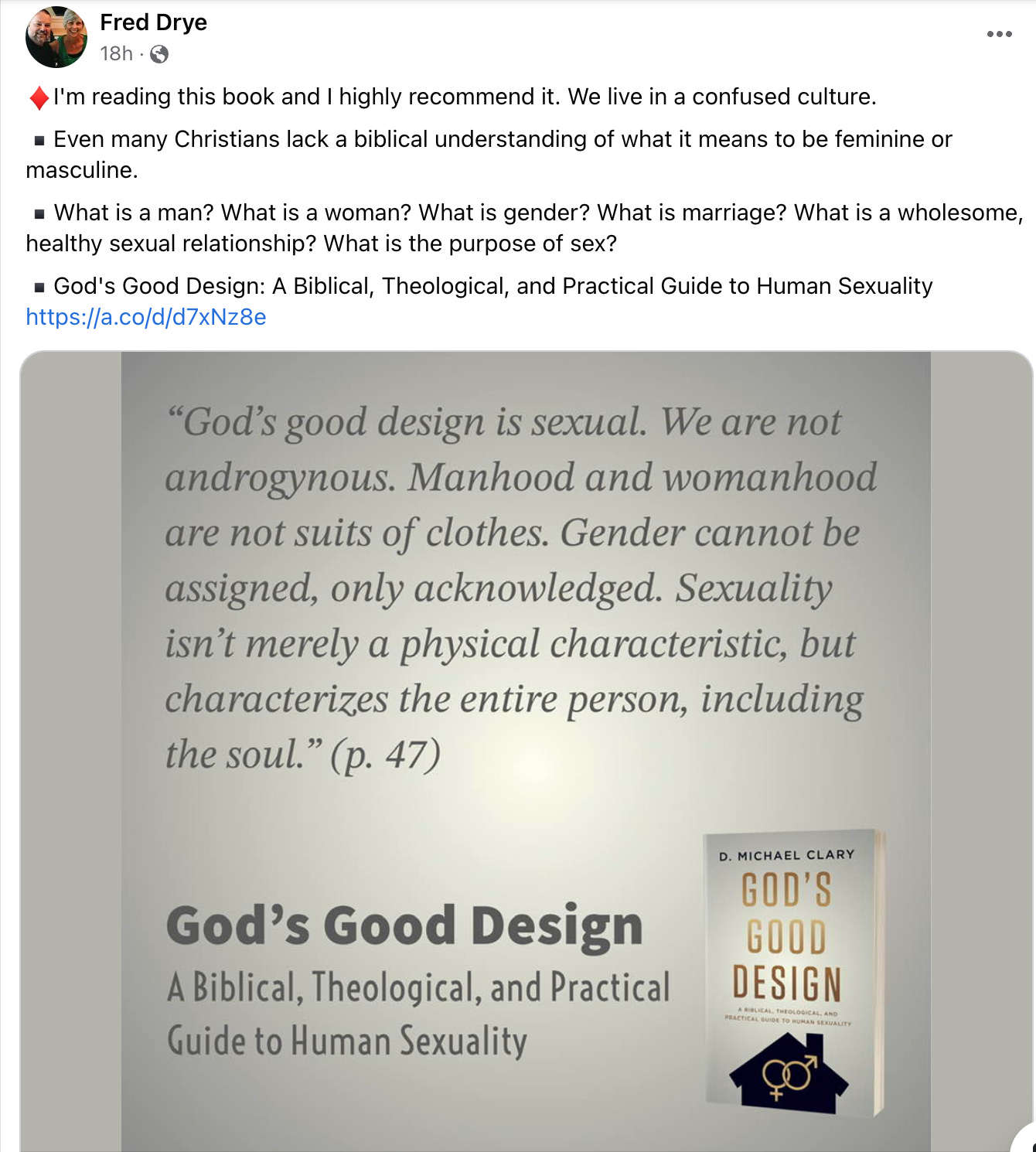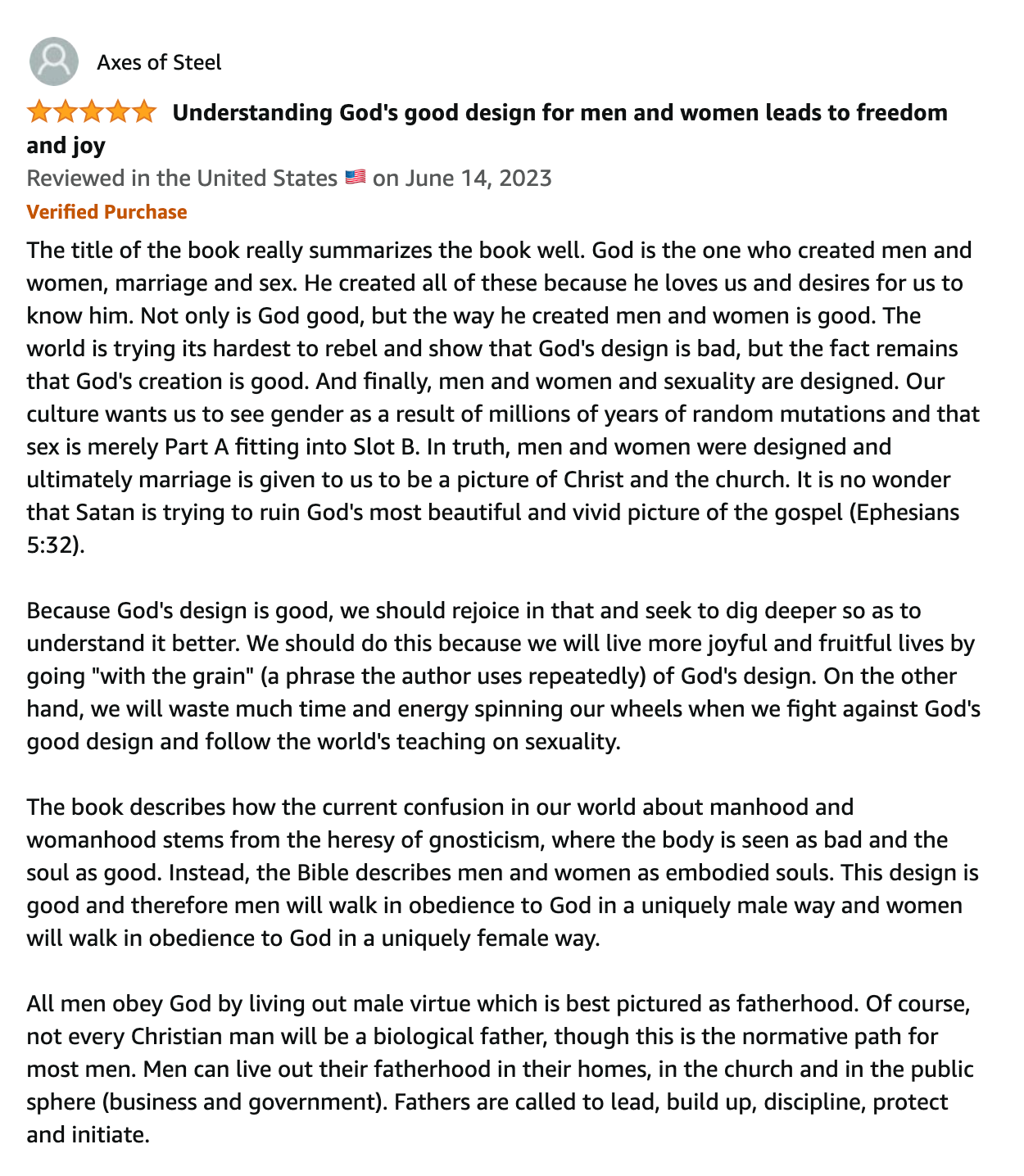Godly Masculinity
Are Pastors Too Focused on Biblical Manhood?
I had a fellow pastor tell me recently that “macho masculinity” is a bigger problem in reformed churches than passivity and weakness. He was writing me in response to my substack article a few weeks ago about the fallacy of servant leadership. I’ll admit that the title of that post is a little click-baity, but it got people talking about the good/bad of the servant leadership model, which is a good thing.
For the record, when properly defined according to scripture, servant leadership is good and biblical. My objection is that the “servant” part is used to eliminate the “leadership” part. (Rich Lusk wrote a piece about this a couple of years ago, if you’re interested).
Anyway, my pastor friend said, “in our Reformed circles, I see much more of a problem with macho mentality.” In response, I said, “which is the bigger problem: men who are too masculine (i.e., so called “toxic masculinity”), or not masculine enough (can’t lead, are indecisive, are not providing for their families, etc.)?” He said he’d personally seen too much of the former. But when consulting some other colleagues, two-thirds of them said the latter.
Two thoughts about this. First, this topic will be informed by one’s personal experience. My pastor friend and I have different experiences with men in our churches. He sees too much masculine bravado, and wants to challenge men to understand masculinity more holistically. I see passivity and weakness, and I want to challenge men to become more strong and decisive.
Second, we need to look at meta-trends in our culture to see what’s happening more broadly. In the modern world, nearly all expressions of true masculinity are seen as toxic and harmful. Men who are assertive, confident, direct, bold, and commanding are seen as threatening. When men are daily faced with cultural messaging that tells them their natural dispositions are toxic, how will that affect them?
According to this New York Times article, “The Crisis of Men and Boys,” men are struggling:
They are struggling in the classroom. American girls are 14 percentage points more likely to be “school ready” than boys at age 5, controlling for parental characteristics. By high school, two-thirds of the students in the top 10 percent of the class, ranked by G.P.A., are girls, while roughly two-thirds of the students at the lowest decile are boys. In 2020, at the 16 top American law schools, not a single one of the flagship law reviews had a man as editor in chief.
Men are struggling in the workplace. One in three American men with only a high school diploma — 10 million men — is now out of the labor force. The biggest drop in employment is among young men aged 25 to 34. Men who entered the work force in 1983 will earn about 10 percent less in real terms in their lifetimes than those who started a generation earlier. Over the same period, women’s lifetime earnings have increased 33 percent. Pretty much all of the income gains that middle-class American families have enjoyed since 1970 are because of increases in women’s earnings.
Men are also struggling physically. Men account for close to three out of every four “deaths of despair” — suicide and drug overdoses. For every 100 middle-aged women who died of Covid up to mid-September 2021, there were 184 middle-aged men who died.
Another article tells a similar story:
[W]hile women have become relatively more educated and involved in the workforce over the past several decades, the opposite is true for men on both counts.
From 1972-2019, the proportion of bachelor’s degrees awarded to both genders shifted from a 12% gap in favor of men to a 14% gap in favor of women - a trend that one author called “the strangest and most profound change of the century.”
Women now graduate high school, enroll in college, and graduate college at higher rates than men, and the COVID-induced drop in postsecondary enrollment was much starker among men (5.1% decrease) compared to women (0.7% decrease). Attending college is, of course, not the only path into the workforce, but men are regressing on this broader front as well - from 1950-2015, the percentage of men in the labor force decreased from 86.4% to 69.1%, while the percentage of women increased from 33.9% to 56.7%.
One of the most worrying public health trends of the past two decades has been the rise of “deaths of despair”, or deaths due to suicide, drug overdose, or alcohol poisoning. Depending on the age group, deaths of despair have increased between 56% and 387% over the past two decades for a (pre-pandemic) average of 70,000 deaths per year, with that figure certain to rise in the wake of COVID-related social disruption. While large groups of men and women have succumbed to deaths of despair, data indicates that this phenomenon might be disproportionately affecting men - Brookings suggests that “significant drops in hope among less-educated white males preceded deaths of despair by several decades”, and social scientist Patrick T. Brown notes that drug-related deaths have risen most sharply among unmarried men over the past decade.
I could go on. But the bottom line is this: men aren’t doing well. Modern men are starved for purpose, friendship, and respect. And when men go bad, society goes bad.
I think the “macho masculinity” (exaggerated masculinity) that my pastor friend observed is merely the flip side of the “passive/weak masculinity” (diminished masculinity) problem. In both cases, men have a distorted view of what it means to be a man. This can largely be attributed to the epidemic of fatherlessness in our society, leading boys to figure out what their masculinity means without a father to guide them. The solution in either case is to teach men that their God given masculinity is glorious and show them how to fulfill their masculine vocations in a God honoring way.
When passive/weak men learn these lessons in their 20s or 30s, things they should have learned in their childhood, they sometimes go through a season of clumsily embracing their masculinity in a performative way. They don’t know how to be truly masculine, but they’re trying to figure it out. What comes out is often an exaggerated version of masculinity. He’s too bold. He lacks tact. He comes off as cocky. The message for a man like this is not to exchange his exaggerated masculinity for a diminished masculinity. He should be taught to harness his strength and aggression and channel it in God honoring ways.
Why the Pastoral Office is Restricted to Godly Men
After the Southern Baptist Convention passed a resolution reaffirming its commitment to restricting the pastoral office to biblically qualified men, I decided to write a few thoughts about it on Twitter. It attracted a lot of attention (and controversy!). It’s always fascinating to me how saying something so boringly biblical as this in a public space like Twitter attracts so much heat.
The pastorate is a masculine office. Here’s why.
Pastors who speak the truth of scripture boldly are putting themselves in harm’s way for the sake of God's people. Godly pastors run towards this danger, not away from it, because that’s how you protect the sheep.
A faithful pastor will be regularly exposed to public ridicule and slander. He shouldn’t complain. He should expect it. This is what he signed up for.
This is why, among many reasons, women are not called to be pastors. It is glorious for a man to embrace public scorn for the sake of truth, because doing so aligns with his God given masculine disposition.
But women have a different, feminine disposition and a different glory to pursue. By nature, women are more risk averse and more likely to shrink from danger. This is because God made women to protect the potential for new life that exists within their own bodies. Thus, it is in the nature of women to run from danger. In most cases, it need not be considered cowardly for women to do so, because it is not in the nature of women to run towards danger. But for men, it is. To face and overcome a terrible threat thrills the heart of a man. Men of old dreamed of dying gloriously in a worthy battle for those he loves.
This is why you can’t appoint a woman to the office of pastor without fundamentally changing the office. Woman take a dangerous calling and make it safer. Since the primary danger of the pastoral office entails guarding the truth, biblical authority is the first casualty when women become pastors.
Women are well equipped to serve the church in a number of ways, but not as pastors. This is a masculine office and masculine calling. Godly men should do the dangerous work of shepherding souls, and godly women should neither seek nor desire it.
Ten Theses on Biblical Sexuality
As a follow up to that post, I sketched out a few basic theses on biblical sexuality and posted those on Twitter too. It’s not an exhaustive list, but represents a sample of my foundational thoughts about how I approach biblical sexuality.
Ten Theses on Sexuality
1. God created two and only two sexes.
2. Sex encompasses the whole person, both body and spirit. Additionally, sexuality is eternal. Our glorified resurrection bodies will be either male or female forever.
3. God gives different aptitudes, dispositions, and duties to each sex.
4. God created the sexes to be interdependent.
5. This interdependence is reflected in household relationships (husband/wife, father/mother, brother/sister, son/daughter).
6. God’s design is written into the created order. When Jesus was asked about divorce, he point to the created order ("Have you not read that he who created them from the beginning made them male and female," Matt 19:4). Paul's teaching about sexuality was likewise rooted in the created order (1 Tim 2:8-15 and 1 Cor 11:3).
7. Each sex is tethered to the purpose for which they were created.
8. Virtue corresponds to design (virtuous masculinity is fatherly and virtuous femininity is motherly).
9. God’s design is taught in scripture and observable in nature. There are moral obligations regarding sexuality that can be discerned from observing nature (Rom 1:26-27).
10. Exceptions (such as intersex) are the result of the fall and do not negate the above theses.
This list is just a sample. There's lots more to say, but these fill in the gaps a little more into my thought process. My book also addresses singleness, productive households, gendered virtue, sexual immorality, and more. Every point is demonstrated with plenty of biblical support.
More Sightings of God’s Good Design in the Wild!
The book continues to do well and I’m encouraged. I’m starting to go on podcasts to promote the book now and will post links to those interviews when available. If you have any suggestions for podcasts I should contact, please let me know!






